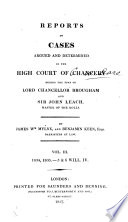 | Great Britain. Court of Chancery, James William Mylne, Benjamin Keen (Reporter) - 1834 - 772 σελίδες
...perhaps under both, comes the other principle, which is quite undeniable, that whatever is notice enough to excite attention, and put the party on his guard, and call for inquiry, is also notice of every thing to which it is afterwards found that such inquiry might have led, although... | |
 | Georgia. Supreme Court - 1886 - 990 σελίδες
..."an eminent commentator is, that the principle is well established, i; that whatever is notice enough to excite attention and put the party on his guard and call for inquiry, is also notice of everything to which it is afterwards found that such inquiry might have led, although... | |
 | Great Britain. Court of Chancery - 1855 - 830 σελίδες
...perhaps under both, comes the other principle, which is quite undeniable, that whatever is notice enough to excite attention, and put the party on his guard, and call for in quiry, is also notice of everything to which it is afterwards found that such inquiry might have... | |
 | United States. Supreme Court - 1858 - 676 σελίδες
...well-established principle, that whatever is notice enough to excite attention, and put a party on its guard and call for inquiry, is notice of everything to which such inquiry might have led. When a person has sufficient information to lead him to a fact, he shall be deemed to have notice of it. (Kennedy... | |
 | Illinois. Supreme Court - 1910 - 710 σελίδες
...US 135, quoted with approval from Kennedy v. Greene, 3 My1. & K. 722 : ''Whatever is notice enough to excite attention and put the party on his guard...everything to which such inquiry might have led. When a person has sufficient information to lead him to a fact he shall be deemed conversant of it." In the... | |
 | United States. Circuit Court (1st Circuit), William Henry Clifford - 1869 - 714 σελίδες
...Whatever notice is enough to excite attention, and put the party upon his guard, and call for further inquiry, is notice of everything to which such inquiry might have led. Kennedy v. Green, 3 Myl. & K. 719 ; Carr v. Hilton, 1 Cur. 390. When it appears that a purchaser must... | |
 | Great Britain. Courts - 1870 - 568 σελίδες
...under both, comes the other principle, which "is quite undeniable, that, whatever is notice enough to excite attention and put the party on his guard, and call for inquiry, is also notice of everything to which it is afterwards found that such inquiry might have led, although... | |
 | Edward Burtenshaw Sugden - 1873 - 774 σελίδες
...the while let his agent know, and himself perhaps profit by that knowledge. Whatever is notice enough to excite attention and put the party on his guard, and call for inquiry, is also notice of everything to which it is afterwards found that such inquiry might have led, although... | |
 | 1874 - 802 σελίδες
...well established principle that whatever is notice enough to excite attention and put the party upon his guard, and call for inquiry, is notice of everything to which such inquiry might have led. When a person has sufficient information to lead him to a fact, he shall be deemed conversant of it." The... | |
 | 1881 - 638 σελίδες
...might, by reasonable diligence or caution, have ascertained the facts; and, "whatever is notice enough to excite attention and put the party on his guard and call for inquiry, is also notice of everything to which it is afterwards found that such inquiry might have led. although... | |
| |